The Concept Selected For this Paper Measurement Assignment 2022
VerifiedAdded on 2022/09/21
|6
|1038
|19
Assignment
AI Summary
Contribute Materials
Your contribution can guide someone’s learning journey. Share your
documents today.
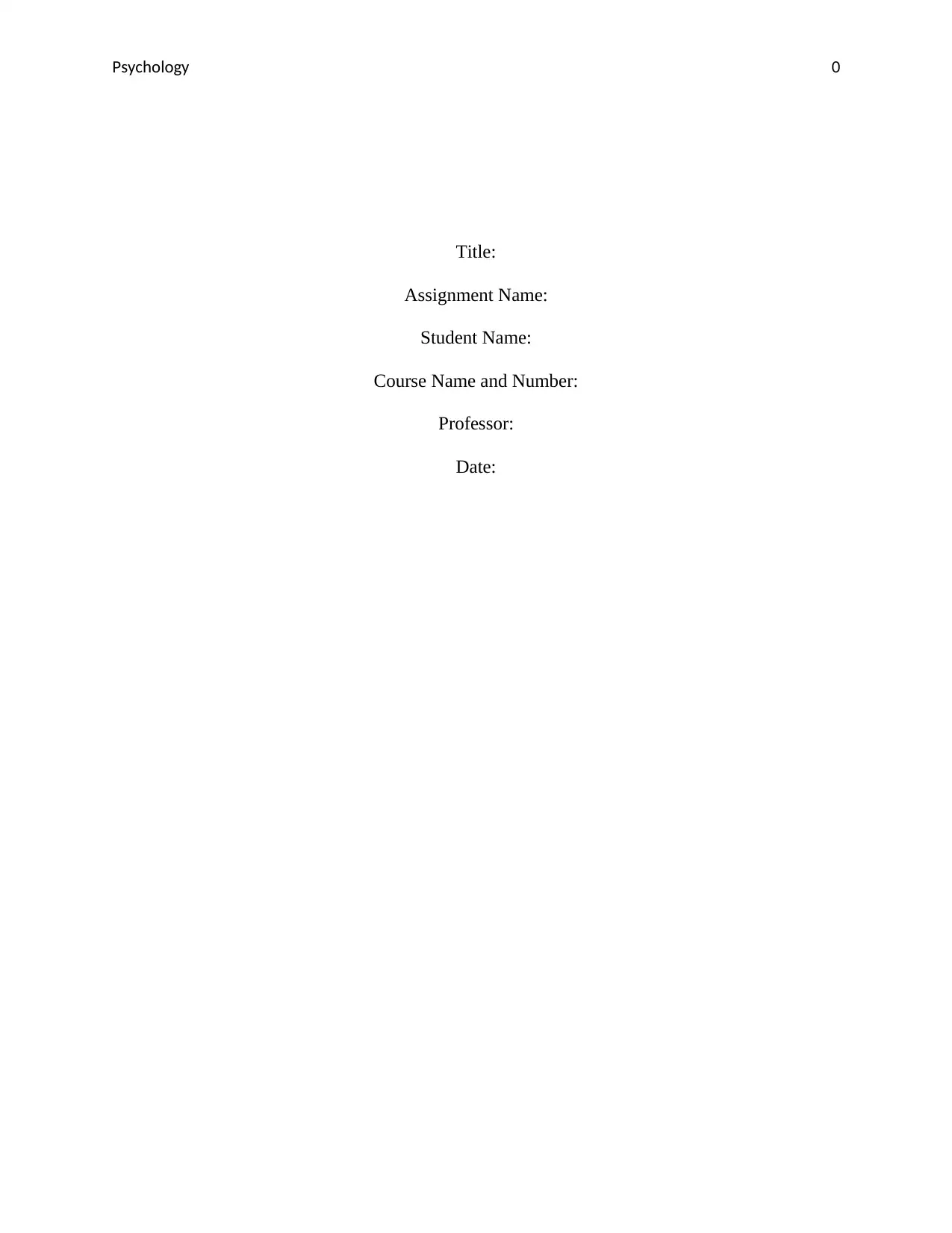
Psychology 0
Title:
Assignment Name:
Student Name:
Course Name and Number:
Professor:
Date:
Title:
Assignment Name:
Student Name:
Course Name and Number:
Professor:
Date:
Secure Best Marks with AI Grader
Need help grading? Try our AI Grader for instant feedback on your assignments.
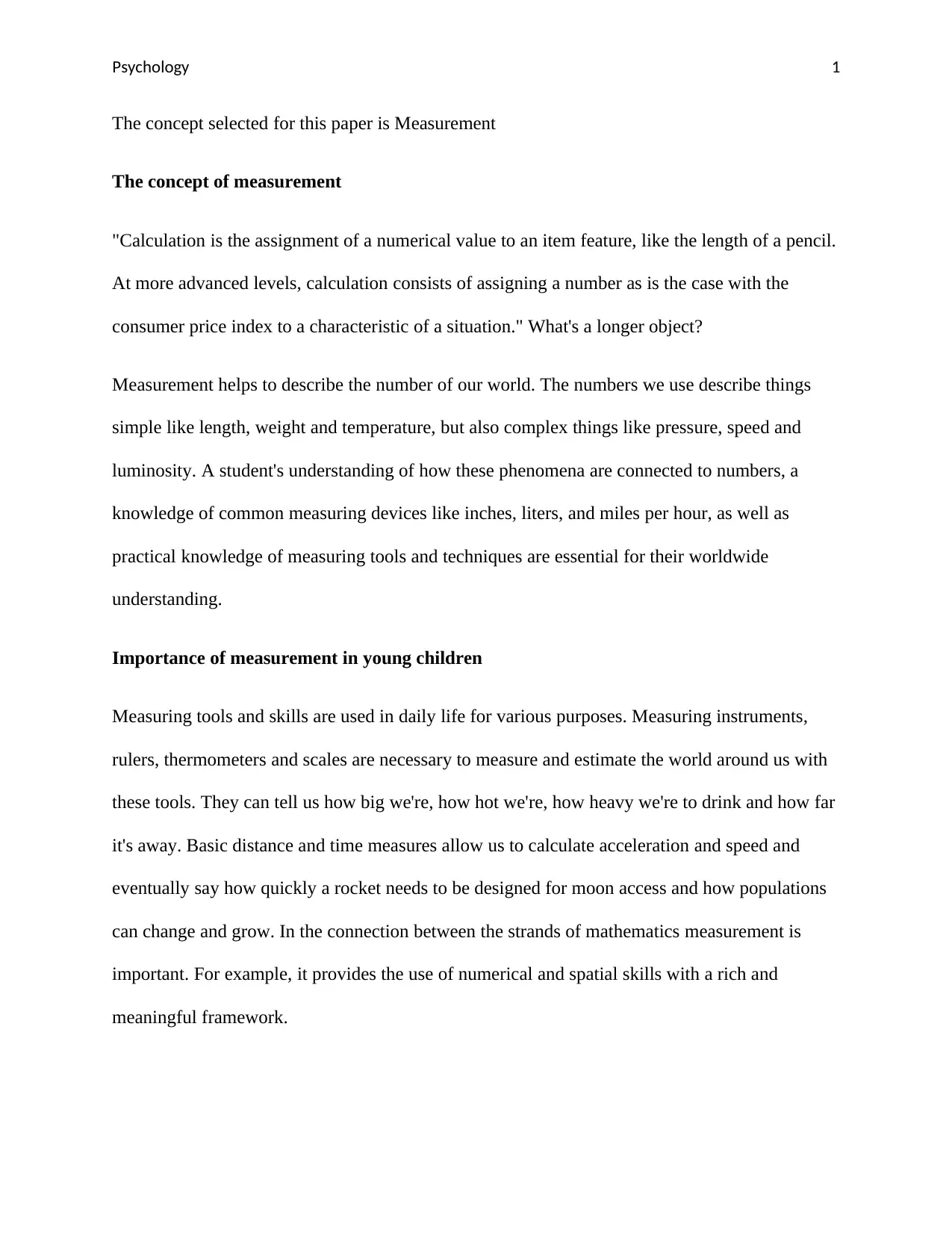
Psychology 1
The concept selected for this paper is Measurement
The concept of measurement
"Calculation is the assignment of a numerical value to an item feature, like the length of a pencil.
At more advanced levels, calculation consists of assigning a number as is the case with the
consumer price index to a characteristic of a situation." What's a longer object?
Measurement helps to describe the number of our world. The numbers we use describe things
simple like length, weight and temperature, but also complex things like pressure, speed and
luminosity. A student's understanding of how these phenomena are connected to numbers, a
knowledge of common measuring devices like inches, liters, and miles per hour, as well as
practical knowledge of measuring tools and techniques are essential for their worldwide
understanding.
Importance of measurement in young children
Measuring tools and skills are used in daily life for various purposes. Measuring instruments,
rulers, thermometers and scales are necessary to measure and estimate the world around us with
these tools. They can tell us how big we're, how hot we're, how heavy we're to drink and how far
it's away. Basic distance and time measures allow us to calculate acceleration and speed and
eventually say how quickly a rocket needs to be designed for moon access and how populations
can change and grow. In the connection between the strands of mathematics measurement is
important. For example, it provides the use of numerical and spatial skills with a rich and
meaningful framework.
The concept selected for this paper is Measurement
The concept of measurement
"Calculation is the assignment of a numerical value to an item feature, like the length of a pencil.
At more advanced levels, calculation consists of assigning a number as is the case with the
consumer price index to a characteristic of a situation." What's a longer object?
Measurement helps to describe the number of our world. The numbers we use describe things
simple like length, weight and temperature, but also complex things like pressure, speed and
luminosity. A student's understanding of how these phenomena are connected to numbers, a
knowledge of common measuring devices like inches, liters, and miles per hour, as well as
practical knowledge of measuring tools and techniques are essential for their worldwide
understanding.
Importance of measurement in young children
Measuring tools and skills are used in daily life for various purposes. Measuring instruments,
rulers, thermometers and scales are necessary to measure and estimate the world around us with
these tools. They can tell us how big we're, how hot we're, how heavy we're to drink and how far
it's away. Basic distance and time measures allow us to calculate acceleration and speed and
eventually say how quickly a rocket needs to be designed for moon access and how populations
can change and grow. In the connection between the strands of mathematics measurement is
important. For example, it provides the use of numerical and spatial skills with a rich and
meaningful framework.
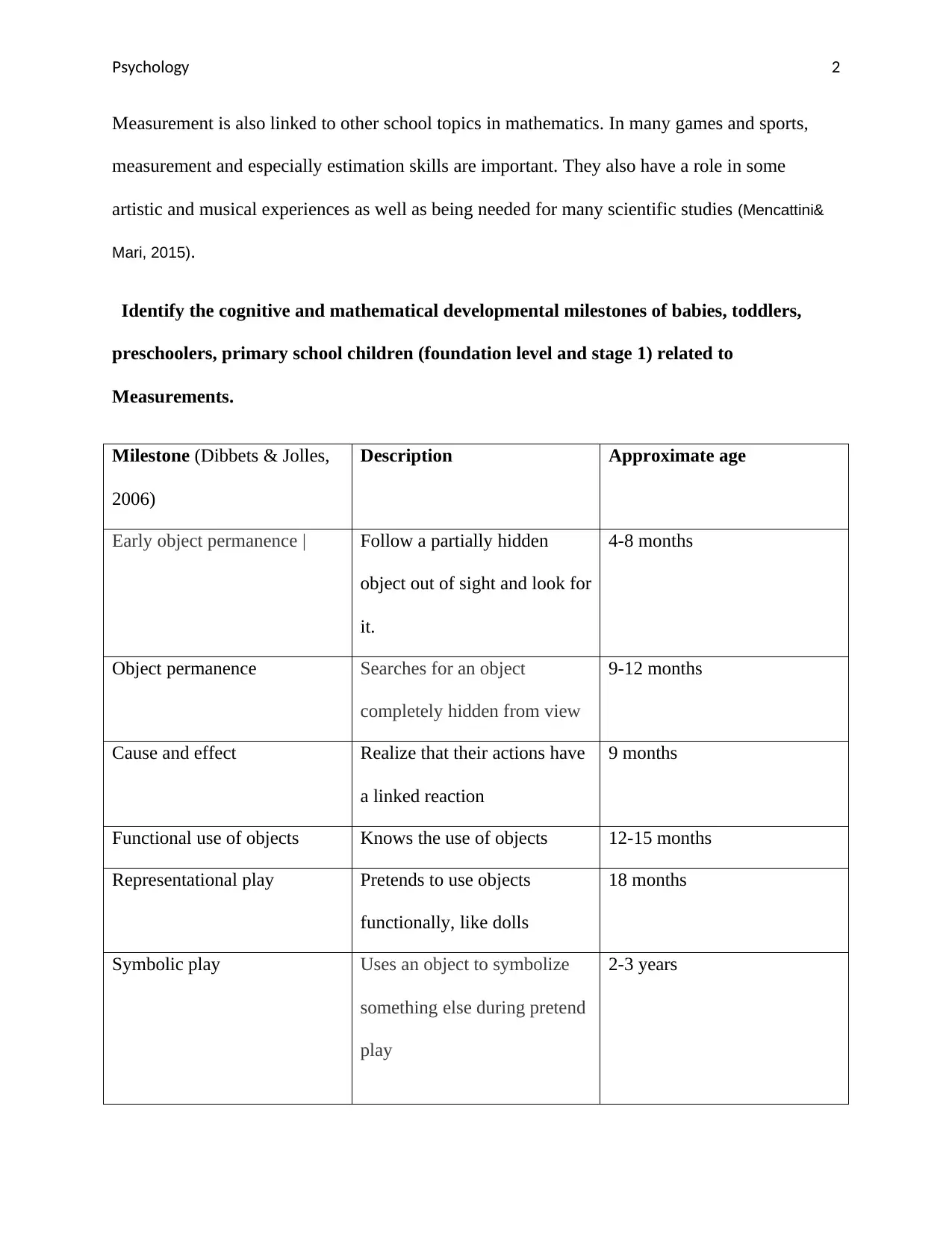
Psychology 2
Measurement is also linked to other school topics in mathematics. In many games and sports,
measurement and especially estimation skills are important. They also have a role in some
artistic and musical experiences as well as being needed for many scientific studies (Mencattini&
Mari, 2015).
Identify the cognitive and mathematical developmental milestones of babies, toddlers,
preschoolers, primary school children (foundation level and stage 1) related to
Measurements.
Milestone (Dibbets & Jolles,
2006)
Description Approximate age
Early object permanence | Follow a partially hidden
object out of sight and look for
it.
4-8 months
Object permanence Searches for an object
completely hidden from view
9-12 months
Cause and effect Realize that their actions have
a linked reaction
9 months
Functional use of objects Knows the use of objects 12-15 months
Representational play Pretends to use objects
functionally, like dolls
18 months
Symbolic play Uses an object to symbolize
something else during pretend
play
2-3 years
Measurement is also linked to other school topics in mathematics. In many games and sports,
measurement and especially estimation skills are important. They also have a role in some
artistic and musical experiences as well as being needed for many scientific studies (Mencattini&
Mari, 2015).
Identify the cognitive and mathematical developmental milestones of babies, toddlers,
preschoolers, primary school children (foundation level and stage 1) related to
Measurements.
Milestone (Dibbets & Jolles,
2006)
Description Approximate age
Early object permanence | Follow a partially hidden
object out of sight and look for
it.
4-8 months
Object permanence Searches for an object
completely hidden from view
9-12 months
Cause and effect Realize that their actions have
a linked reaction
9 months
Functional use of objects Knows the use of objects 12-15 months
Representational play Pretends to use objects
functionally, like dolls
18 months
Symbolic play Uses an object to symbolize
something else during pretend
play
2-3 years
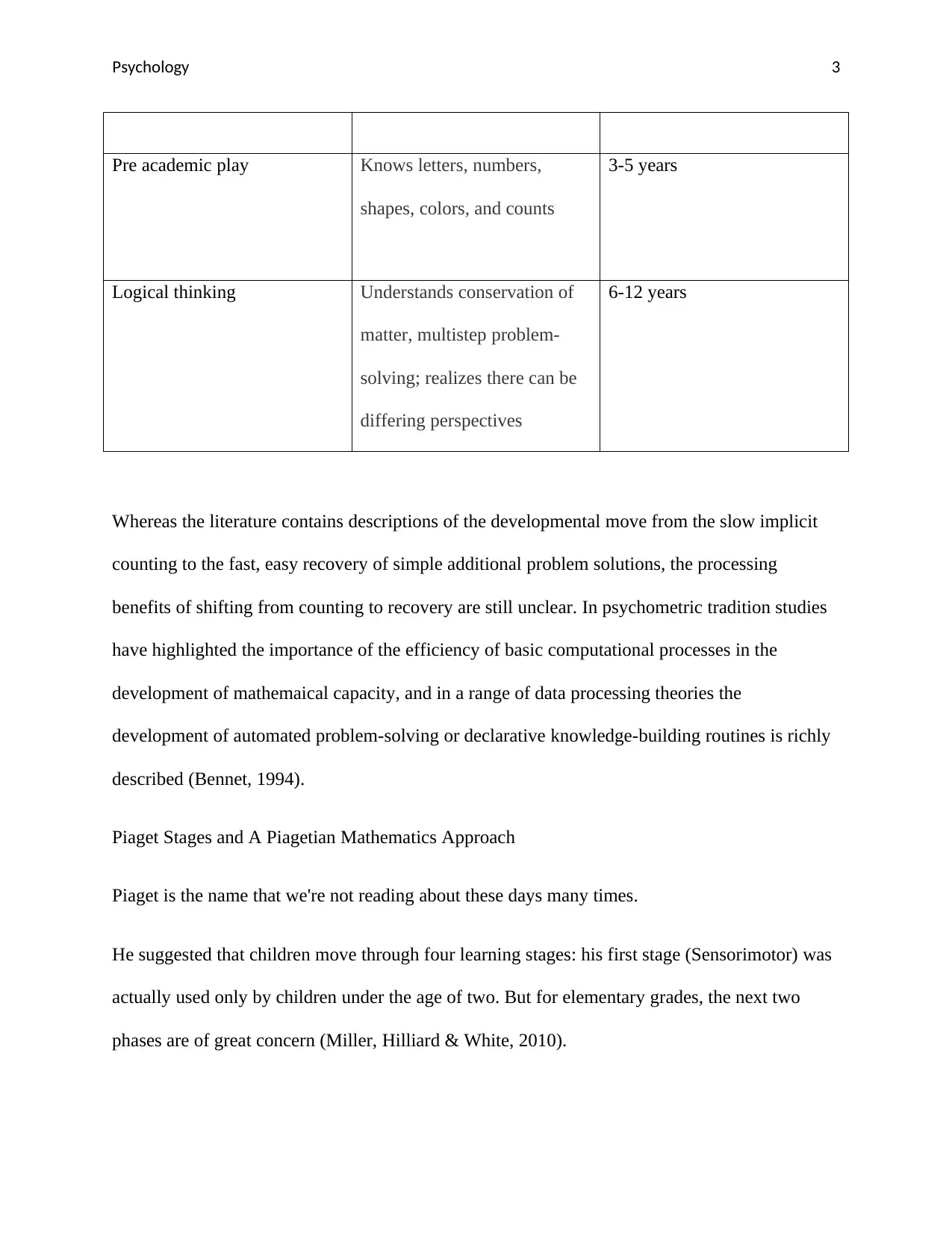
Psychology 3
Pre academic play Knows letters, numbers,
shapes, colors, and counts
3-5 years
Logical thinking Understands conservation of
matter, multistep problem-
solving; realizes there can be
differing perspectives
6-12 years
Whereas the literature contains descriptions of the developmental move from the slow implicit
counting to the fast, easy recovery of simple additional problem solutions, the processing
benefits of shifting from counting to recovery are still unclear. In psychometric tradition studies
have highlighted the importance of the efficiency of basic computational processes in the
development of mathemaical capacity, and in a range of data processing theories the
development of automated problem-solving or declarative knowledge-building routines is richly
described (Bennet, 1994).
Piaget Stages and A Piagetian Mathematics Approach
Piaget is the name that we're not reading about these days many times.
He suggested that children move through four learning stages: his first stage (Sensorimotor) was
actually used only by children under the age of two. But for elementary grades, the next two
phases are of great concern (Miller, Hilliard & White, 2010).
Pre academic play Knows letters, numbers,
shapes, colors, and counts
3-5 years
Logical thinking Understands conservation of
matter, multistep problem-
solving; realizes there can be
differing perspectives
6-12 years
Whereas the literature contains descriptions of the developmental move from the slow implicit
counting to the fast, easy recovery of simple additional problem solutions, the processing
benefits of shifting from counting to recovery are still unclear. In psychometric tradition studies
have highlighted the importance of the efficiency of basic computational processes in the
development of mathemaical capacity, and in a range of data processing theories the
development of automated problem-solving or declarative knowledge-building routines is richly
described (Bennet, 1994).
Piaget Stages and A Piagetian Mathematics Approach
Piaget is the name that we're not reading about these days many times.
He suggested that children move through four learning stages: his first stage (Sensorimotor) was
actually used only by children under the age of two. But for elementary grades, the next two
phases are of great concern (Miller, Hilliard & White, 2010).
Secure Best Marks with AI Grader
Need help grading? Try our AI Grader for instant feedback on your assignments.
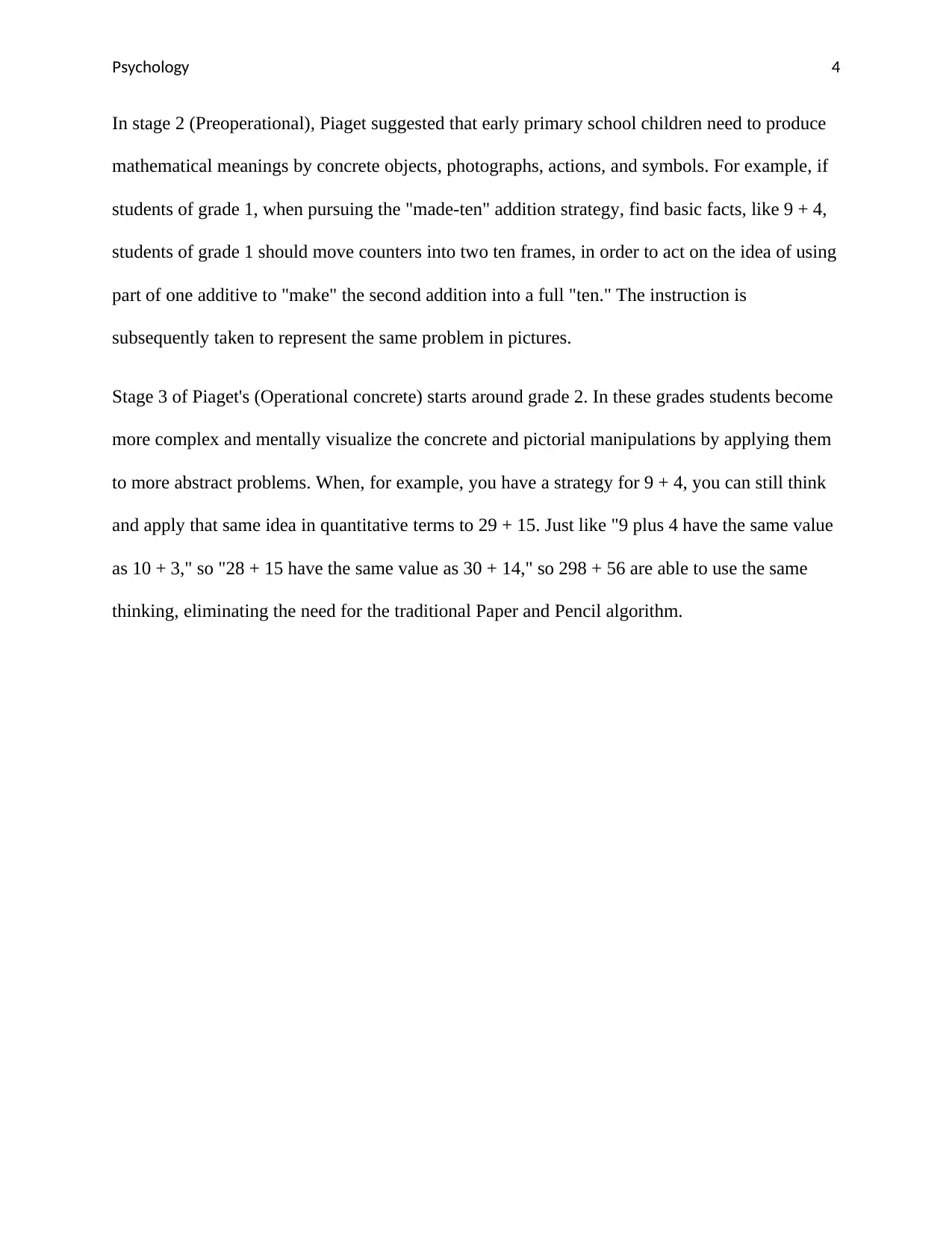
Psychology 4
In stage 2 (Preoperational), Piaget suggested that early primary school children need to produce
mathematical meanings by concrete objects, photographs, actions, and symbols. For example, if
students of grade 1, when pursuing the "made-ten" addition strategy, find basic facts, like 9 + 4,
students of grade 1 should move counters into two ten frames, in order to act on the idea of using
part of one additive to "make" the second addition into a full "ten." The instruction is
subsequently taken to represent the same problem in pictures.
Stage 3 of Piaget's (Operational concrete) starts around grade 2. In these grades students become
more complex and mentally visualize the concrete and pictorial manipulations by applying them
to more abstract problems. When, for example, you have a strategy for 9 + 4, you can still think
and apply that same idea in quantitative terms to 29 + 15. Just like "9 plus 4 have the same value
as 10 + 3," so "28 + 15 have the same value as 30 + 14," so 298 + 56 are able to use the same
thinking, eliminating the need for the traditional Paper and Pencil algorithm.
In stage 2 (Preoperational), Piaget suggested that early primary school children need to produce
mathematical meanings by concrete objects, photographs, actions, and symbols. For example, if
students of grade 1, when pursuing the "made-ten" addition strategy, find basic facts, like 9 + 4,
students of grade 1 should move counters into two ten frames, in order to act on the idea of using
part of one additive to "make" the second addition into a full "ten." The instruction is
subsequently taken to represent the same problem in pictures.
Stage 3 of Piaget's (Operational concrete) starts around grade 2. In these grades students become
more complex and mentally visualize the concrete and pictorial manipulations by applying them
to more abstract problems. When, for example, you have a strategy for 9 + 4, you can still think
and apply that same idea in quantitative terms to 29 + 15. Just like "9 plus 4 have the same value
as 10 + 3," so "28 + 15 have the same value as 30 + 14," so 298 + 56 are able to use the same
thinking, eliminating the need for the traditional Paper and Pencil algorithm.
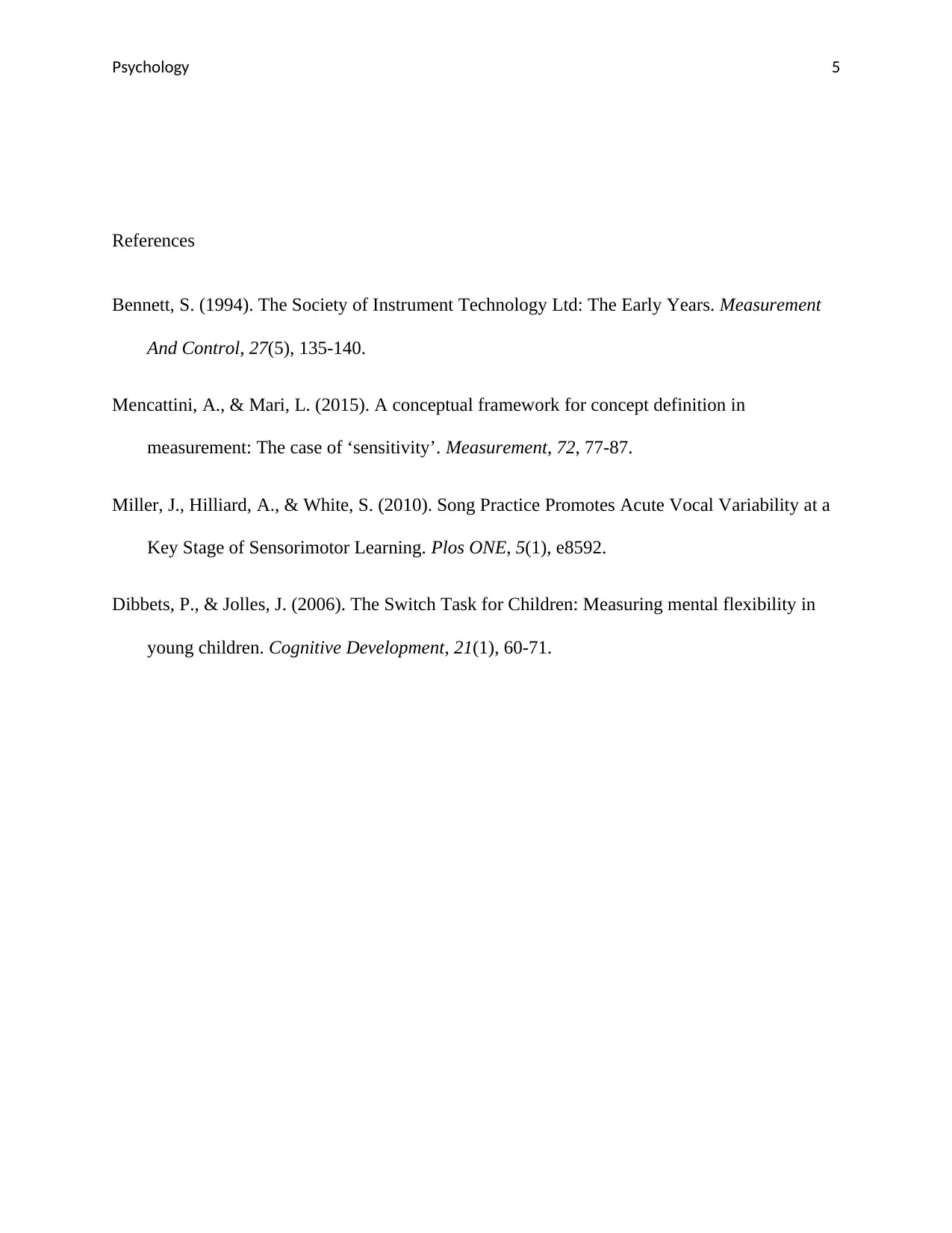
Psychology 5
References
Bennett, S. (1994). The Society of Instrument Technology Ltd: The Early Years. Measurement
And Control, 27(5), 135-140.
Mencattini, A., & Mari, L. (2015). A conceptual framework for concept definition in
measurement: The case of ‘sensitivity’. Measurement, 72, 77-87.
Miller, J., Hilliard, A., & White, S. (2010). Song Practice Promotes Acute Vocal Variability at a
Key Stage of Sensorimotor Learning. Plos ONE, 5(1), e8592.
Dibbets, P., & Jolles, J. (2006). The Switch Task for Children: Measuring mental flexibility in
young children. Cognitive Development, 21(1), 60-71.
References
Bennett, S. (1994). The Society of Instrument Technology Ltd: The Early Years. Measurement
And Control, 27(5), 135-140.
Mencattini, A., & Mari, L. (2015). A conceptual framework for concept definition in
measurement: The case of ‘sensitivity’. Measurement, 72, 77-87.
Miller, J., Hilliard, A., & White, S. (2010). Song Practice Promotes Acute Vocal Variability at a
Key Stage of Sensorimotor Learning. Plos ONE, 5(1), e8592.
Dibbets, P., & Jolles, J. (2006). The Switch Task for Children: Measuring mental flexibility in
young children. Cognitive Development, 21(1), 60-71.
1 out of 6
Your All-in-One AI-Powered Toolkit for Academic Success.
+13062052269
info@desklib.com
Available 24*7 on WhatsApp / Email
![[object Object]](/_next/static/media/star-bottom.7253800d.svg)
Unlock your academic potential
© 2024 | Zucol Services PVT LTD | All rights reserved.